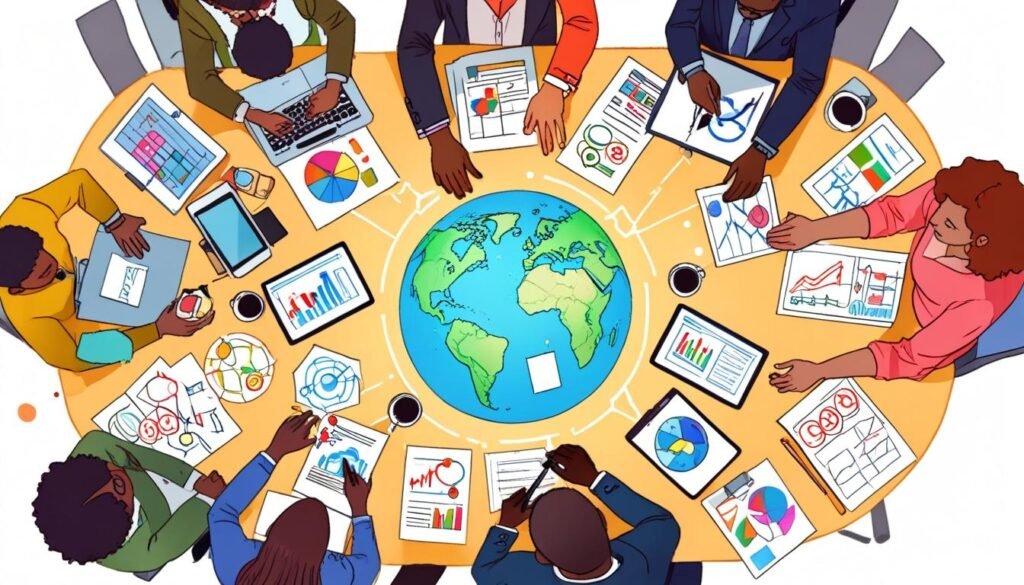**London**: The article discusses the pivotal roles in procurement transformation, highlighting the significance of a structured approach that includes people, processes, and technology. Insights from experts emphasise the importance of defining roles clearly to enhance efficiency and foster innovation within organisations.
Procurement transformation has emerged as a critical focus for organisations aiming to enhance efficiency and value generation in their operations. The process is fundamentally structured around three pillars: people, processes, and technology, with a substantial emphasis on the significance of human resources. It is understood that successful procurement transformation relies heavily on assigning clear roles and responsibilities to team members.
A comprehensive approach to defining these roles is exemplified by Joël Collin-Demers’ ProcureTech Project Role Checklist. He emphasises that crucial to the success of any procurement technology initiative is the avoidance of momentum loss due to the absence of necessary resources. Highlighting the flexibility in the assignment of roles, Collin-Demers points out that “each role does not necessarily represent an individual. An individual contributor may be able to fill many of these roles at once depending on the scope of your project.”
The checklist includes several categories of roles pivotal to a procurement transformation project:
-
Project Management: This entails positions such as Executive Sponsor, Project Manager (PM), Project Control Officer (PCO), and Integration Lead, focusing on overseeing and coordinating the project effectively.
-
Procurement Expertise: Here, roles include Procurement Process Lead, Procurement Analyst, Subject Matter Experts (SMEs), and Super Users, all vital for steering procurement-related decisions.
-
Information Technology Expertise: This category encompasses a range of technical roles including Enterprise/IT Architect, Business Analyst, IT/Technical Lead, and Data Analyst/Engineer, all essential for the integration of technology into procurement processes.
-
Additional Functional Expertise: This segment presents roles such as Regional/Local Leads, Finance/AP Analyst, Legal/Compliance Advisor, and Sustainability Specialist, with a focus on addressing broader organisational needs.
-
Change Management: Key positions such as Change Management Lead and Training Leads are vital for ensuring the successful adoption of new processes and approaches.
-
Software Vendor Expertise: This group includes roles like Vendor/Implementation Partner and Systems Administrator, necessary for the technical support and maintenance of procurement systems.
Furthermore, the concept of MVPs (Most Valuable Players) in procurement, introduced by Jesus Campos, CEO of CorporateLATAM, highlights the individuals whose contributions significantly elevate procurement effectiveness. These MVPs help shift the focus of procurement from mere cost-reduction strategies to creating substantial value for organisations.
Emerging responsibilities within this landscape include:
-
The Digital Transformer, who bridges various operational areas and leverages digital platforms for enhanced functionality.
-
The Quality and Sustainability Advocate, tasked with improving supply chain conditions and supplier interactions to elevate product standards.
-
The Risk Manager, responsible for navigating environmental and societal concerns within organisational goals, thereby fortifying corporate social responsibility (CSR) initiatives.
-
The Chief Procurement Officer (CPO), crucial during times of uncertainty to guide teams through transformation efforts.
-
The Supply Analyst, who plays a key role in harnessing data to drive procurement strategies, while also working closely with category managers to create models that boost category value.
-
The category manager, who ensures alignment between procurement strategies and organisational objectives while facilitating collaboration across teams.
As organisations embark on procurement transformation, it is paramount to recognise and empower these valuable players within their teams. Harnessing the capabilities of these roles not only helps streamline the procurement process but also cultivates a culture of innovation and excellence across the organisation.
Source: Noah Wire Services





